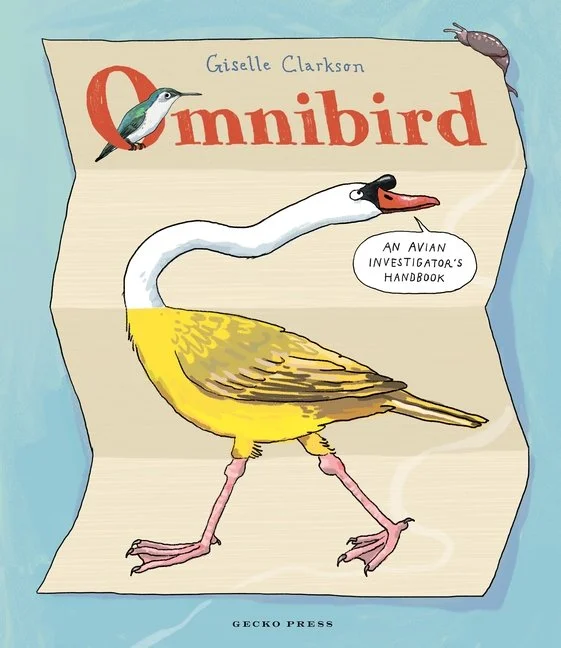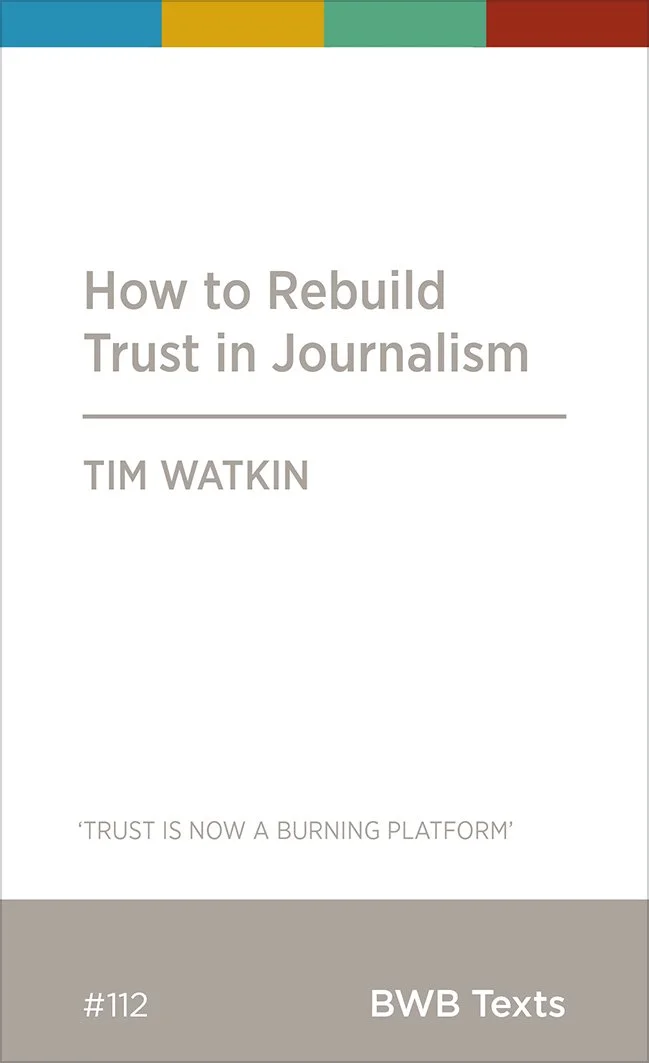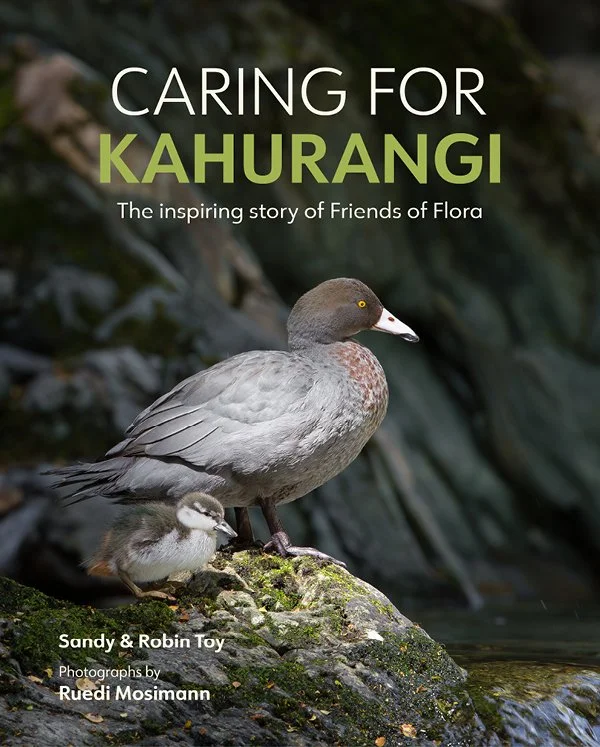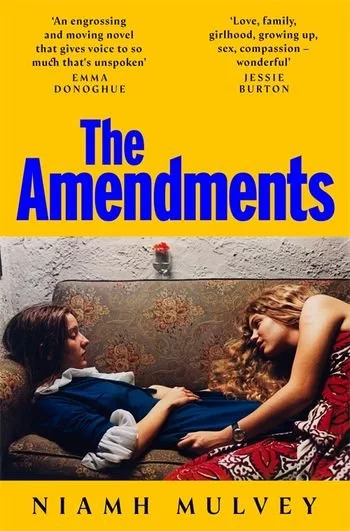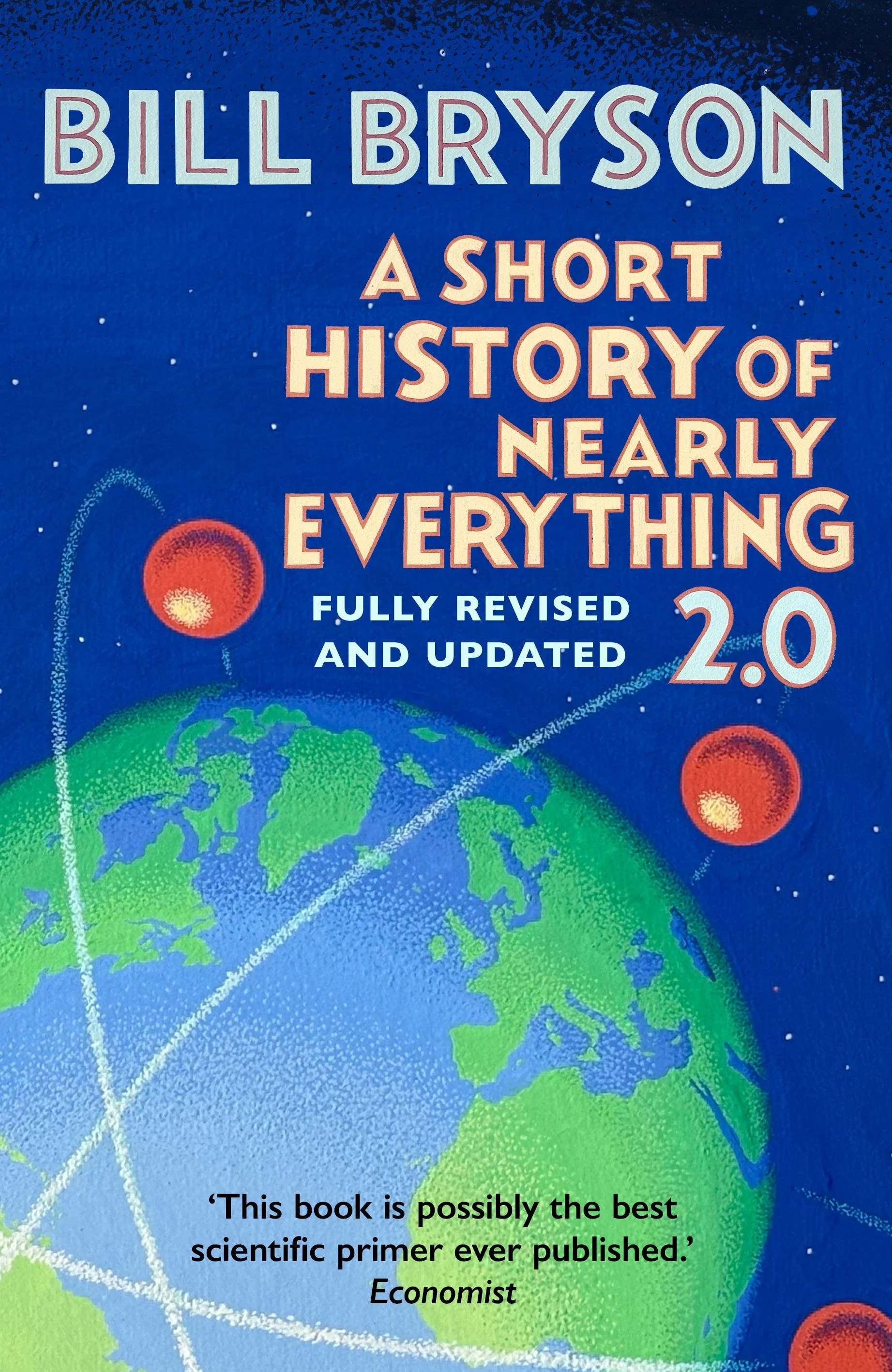NEW RELEASES (30.10.25)
All your choices are good! Click through to our website (or just email us) to secure your copies, and we will dispatch your books by overnight courier or have them ready to collect from our door in Church Street, Whakatū.
Omnibird: An avian investigator’s handbook by Giselle Clarkson $45
This highly illustrated, playful field-guide to common international birds brings the art of observology to the science of ornithology, showing the many ways these familiar creatures are remarkable if you take time to look. Have you seen a bird today? Probably, unless you’re reading this in bed in the morning. Did you truly look at the bird? To open your ornithological eyes and ears, meet the Omnibird. An Omnibird contains the essential birdiness of every bird—it was born from an egg, has feathers, two legs, a beak and gizzard, perhaps some premium features like spurs or a curuncle. Once you recognise the Omnibird, you’ll see the remarkable in any bird. You’ll be expert at finding extraordinary things around you, just by looking. Omnibird describes 12 common birds from habitats around the world—eagles, owls and seabirds, starlings, ducks and swans. You will explore the incredible internal structure of bird bones, learn what a gizzard stone is for, meet the tiny creatures that live on birds, and find the fascinating in eggs, bird poop, feathers, and flight patterns. Now you’re an Omnibird expert, you’ll look at every bird in new ways every day. [Large-format hardback]
>>Look inside!
>>A big, funny book all about ornithology.
>>The Observologist.
How to Rebuild Trust in Journalism by Tim Watkin $20
”There is little more important to the success of the human species than the trust that allows information networks to form and thrive, communities to share and trade, and people to see the world as it really is.” Award-winning journalist Tim Watkin confronts the breakdown in trust between journalism and the public. Drawing on the latest international and local research, he explores the social, economic and political shifts that have eroded public confidence in journalism. From financial pressures and ideological divides, to a perceived lack of transparency and the rise of misinformation, How to Rebuild Trust in Journalism examines how journalism’s role has been questioned — and what can be done to restore its standing. [Paperback]
>>Other BWB Texts.
Chapter on Love by Miklós Szentkuthy (translated from Hungarian by Erika Mihálycsa) $55
Written between Szentkuthy's first major work, Prae (1934), and the first book of the St. Orpheus Breviary (1939), Chapter on Love (publ. 1936) exemplifies well Szentkuthy's writing of excess. An attempt at polyphonic writing, it brings together the perspectives of an unlikely set of characters including the mayor of a doomed Italian city, given to debilitating ‘impressionism’ — a penchant for observing and analysing —apart the minutest shades of reality — a nihilistic pope, a hanged brigand, a courtesan and her decadent pubertal adorer. They pass through the pages of this quixotic and compelling book under the threat of imminent catastrophe, filling chapter after chapter with passionate, self-generating theorising and (mock-)philosophising on the margins of Empedocles, life and death, stockings, endingness and changeability, ethics and aesthetics, vitality and law, chaos and social order grounded in horror vacui, the forever elusive other person — all enmeshed with well-nigh self-parodic, idiosyncratic feats of ratiocination and theorising driven ad absurdum, which proliferate on the analogy of (free) association. The common denominator of their analytical furore and the yarns they spin is love, which touches not only on the human being, but the whole of nature, from the realm of plants to that of minerals. Szentkuthy's book may don the costume of a historical novel, but it stands under the sign of the pseudo: its deliberately vague setting, somewhere in Italy toward the end of the Renaissance, is in fact but a mask which allows for anachronism (of realia, ideas, data, and even terminology) to ooze through, as the characters and their observations are our contemporaries in every respect. Baroque and exuberant, of a sweeping melancholia and at times savage humor, a (mock-)treatise written with an abundance of striking, distant associations that evoke Surrealist practices, this strange novel tantalisingly shows a path not taken by experimental modernism, of the contrapuntal use of point-of-view converted into a contrapuntal use of analytic, essayistic observations of reality. [Paperback]
>>Pressing.
>>Working towards an impossible novel.
The Rose Field (‘The Book of Dust’, Volume 3) by Philip Pullman $38
The long-awaited and highly anticipated conclusion to Philip Pullman’s bestselling ‘The Book of Dust’ sequence. “Lyra: what will you do when you find this place in the desert, the opening to the world of the roses?” ’‘Defend it,” Lyra said. ‘“ie defending it.” When readers left Lyra in The Secret Commonwealth she was alone, in the ruins of a deserted city. Pantalaimon had run from her — part of himself — in search of her imagination, which he believed she had lost. Lyra travelled across the world from her Oxford home in search of her dæmon. And Malcolm, loyal Malcolm, too journeyed far from home, towards the Silk Roads in search of Lyra. In The Rose Field, their quests converge in the most dangerous, breathtaking and world-changing ways. They must take help from spies and thieves, gryphons and witches, old friends and new, learning all the while the depth and surprising truths of the alethiometer. All around them, the world is aflame — made terrifying by fear, power and greed. As they move East, towards the red building that will reunite them and give them answers — on Dust, on the special roses, on imagination — so too does the Magisterium, at war against all that Lyra holds dear. Marking thirty years since the world was first introduced to Pullman’s remarkable heroine Lyra Belacqua in Northern Lights, The Rose Field is the culmination of the cultural phenomenon of The Book of Dust and His Dark Materials. [Paperback]
’Powerful, profound and utterly unforgettable: a stunning trilogy conclusion.’ —The Telegraph
”Pullman's uncanny ability to conjure place is once again in full evidence . . . And when we reach it, the novel's final showdown is a fantastically nail-biting ride.” —The Guardian
”But for all its intricate interweavings of alchemy and folk tales, ballads and poetry, the book has the pacing of a thriller.” —The Times
>>The world is falling apart.
>>Read an extract!
>>Also by Philip Pullman.
Silence Is My Habitat: Ecobiographical essays by Jessica White $37
Jessica White has been deaf since she was four years old. Where an autobiography or biography narrates the story of a person's life, an ecobiography dwells on a person's interaction with their ecosystem, and how this shapes their sense of self. The essays that follow detail how deafness encouraged and shaped her relationship with the natural world. "Deafness made me observant and quiet. Because I could not hear enough to join in on conversations, my attention often wandered or was absorbed by sensations other than sound — morning sun on my forearms, the thick, sweet scent of flowering oleanders, the triangular shadow of a flock of galahs flying overhead. On the long bus trips between school and home, I watched the sorghum burnishing as it ripened, and kangaroos bounding through wheat stubble in the late afternoons, into trees that cast long shadows. I felt the bus shake as it rattled over cattle grids or veered into the corrugations on the gravel roads." These essays consider how deafness shapes the interfaces between the writer and particular environments, given how she can only hear particular sounds, as she navigates the world through the tactile and olfactory. In these poetic essays, she describes her responses to bodies of water, the university, the archive, the bush, and the quietened realm of the pandemic. She writes of burnt trees amidst the devastating loss of her mother. She finds a flock of deaf women writers who help her fly. White reveals that deafness, although it brings fatigue and isolation, is also a portal to a rich, contemplative, and creative life. [Paperback]
Olivetti by Allie Millington $20
Being a typewriter is not as easy as it looks. Surrounded by books (notorious attention hogs) and recently replaced by a computer, Olivetti has been forgotten by the Brindle family—the family he’s lived with for years. The Brindles are busy humans, apart from 12-year-old Ernest, who would rather be left alone with his collection of Oxford English Dictionaries. The least they could do was remember Olivetti once in a while, since he remembers every word they’ve typed on him. It’s a thankless job, keeping memories alive. Olivetti gets a rare glimpse of action from Ernest’s mother, Beatrice—his used-to-be most frequent visitor—only for her to drop him off at Heartland Pawn Shop and leave him helplessly behind. When Olivetti learns Beatrice has mysteriously gone missing afterward, he believes he can help find her. He breaks the only rule of the "typewriterly code" and types back to Ernest, divulging Beatrice’s memories stored inside him. Their search takes them across San Francisco—chasing clues, maybe committing a few misdemeanors. As Olivetti spills out the past, Ernest is forced to face what he and his family have been running from, The Everything That Happened. Only by working together will they find Beatrice, belonging, and the parts of themselves they’ve lost. [Paperback]
"Millington's writing does us a great favor. Her Olivetti is neither an automaton nor a pushover — there is a painful and problematic crisis in the house he has called home and his voice drives the action with compassion. Ernest speaks with a confusion and simmering panic recognisable to anyone who was once 12, loved their mother deeply and feared for her life. The Brindles will go on confronting "Everything," with hope, gusto and all the unity they can muster. They will set the family table for seven, with a place for Olivetti; put paper in his carriage, and wait." —Tom Hanks in the New York Times Book Review
Literature for the People: How the pioneering Macmillan brothers built a publishing powerhouse by Sarah Harkness $35
From an impoverished childhood in the Scottish highlands to Victorian London, this is the story of two brothers – Daniel and Alexander Macmillan — who built a publishing empire — and brought Alice in Wonderland to the world. Their remarkable achievements are revealed in this entertaining, superbly researched biography. Daniel and Alexander arrived in London in the 1830s at a crucial moment of social change. These two idealistic brothers, working-class sons of a Scottish crofter, went on to set up a publishing house that spread radical ideas on equality, science and education across the world. They also brought authors like Lewis Carroll, Thomas Hardy and Charles Kingsley, and poets like Matthew Arnold and Christina Rossetti, to a mass audience. No longer would books be just for the upper classes. Daniel was driven by the knowledge that he was living on borrowed time, his body ravaged by tuberculosis. Alexander took on responsibility for the company as well as Daniel’s family and turned a small business into an international powerhouse. He cultivated the literary greats of the time, weathered controversy and tragedy, and fostered a dynasty that would include future prime minister Harold Macmillan. Includes fascinating insights about the great, the good and the sometimes wayward writers of the Victorian era, with feuds, friendships and passionate debate. [Paperback]
Caring for Kahurangi: The inspiring story of Friends of Flora by Sandy and Robin Toy, with photographs by Ruedi Mosimann $60
Caring for Kahurangi is the story of one of the most successful community-led conservation projects in New Zealand. For the last 25 years, the volunteer group Friends of Flora has been trapping predators, translocating birds, surveying and monitoring, determined to restore the biodiversity of the rugged country of Flora, situated on the eastern edge of Kahurangi National Park. This book describes the journey of Friends of Flora, weaving tales of volunteer adventures, rigorous science and magical encounters into an inspiring story and what can be achieved with great commitment, drive and friendship. [Hardback]
>>Look inside.
The Amendments by Naimh Mulvey $30
Nell and her partner Adrienne are about to have a baby. For Adrienne, parenthood is the start of a new life. For Nell, it's the reason the two of them are sitting in a therapist's office. Because she can't go into this without facing the painful truth: that she has been a mother before. For Dolores, Nell's mother, the news also brings a reckoning: with the way her daughter's life unfolded fifteen years ago, with its inextricable ties to her own past, and with the tragedy that neither of them have spoken about since. Set in Ireland against the backdrop of a series of abortion referendums. [Paperback]
”Niamh Mulvey's wonderfully compelling characters and deft, clear prose offer great pleasure. Her sense of political and cultural change is sharp, and the beauty she finds in days of struggle is haunting.” —Joseph O'Connor
”A smart, subtle, engrossing and moving novel that gives voice to so much that's unspoken about Ireland and about youth.” —Emma Donoghue
Clearing the Air: A helpful guide to solving climate change — In 50 questions and answers by Hannah Ritchie $40
With so many conflicting headlines out there, it's tough to sort fact from fiction when it comes to climate change and the solutions we need for a cleaner future. The first piece of good news is that data scientist Hannah Ritchie is here with answers, and the steps we need to take now. Using simple, clear data, she tackles questions such as, 'Is it too late?', 'Won't we run out of minerals?' and 'Are we too polarised?'. The second piece of good news — the truth is way more hopeful than you might think. We're at a critical moment for our planet, and getting the facts straight is step one. But even more crucial is feeling hopeful about what we can do next. The third piece of good news? We already have many of the solutions we need to create a more sustainable planet for future generations. [Paperback]
”An essential myth-busting primer on climate actions for everyone navigating the blizzard of confusing opinions and misinformation around the defining issue of our time.” —Gaia Vince
”If there were a Nobel Prize for clear thinking, Hannah Ritchie would have my vote. She doesn't just cut through the noise — she vaporises it. With a scientist's rigor and a storyteller's grace, she shows us what the data actually says about the biggest challenges of our time. Her work is essential reading for anyone who still believes facts can change minds and optimism can change the world.” —Rutger Bregman
A Short History of Almost Everything 2.0 by Bill Bryson $40
The 21st century's bestselling popular science book has now been fully revised and updated in Bill Bryson's inimitable style to reflect the many advances in science since this book was first published in 2003. This journey through time and space will inform a new generation of readers as well as those who read this book on first publication with a new perspective based on what we know now. A Short History of Nearly Everything 2.0 is the result of Bill Bryson's quest to understand everything that has happened from the Big Bang to the rise of civilisation — how we got from being nothing at all to what we are today. Now fully updated to include all the latest advances in science, it is more ground-breaking than ever before(!). Bryson makes complex subjects fascinating and accessible to everyone with an interest in the world around them. [Paperback]
”Possibly the best scientific primer ever published.” —Economist
”Truly impressive. It's hard to imagine a better rough guide to science.” —Guardian


